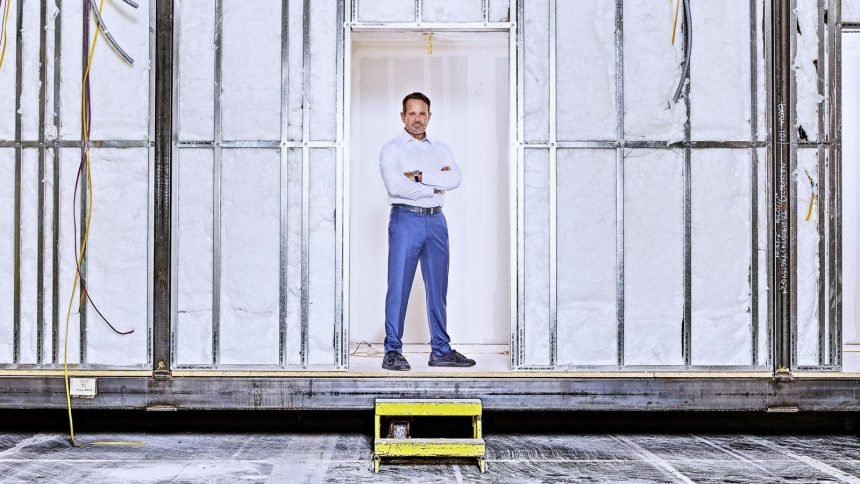Barry Zekelman, a steel magnate with a penchant for high-stakes ventures, has embarked on a billion-dollar gamble to revolutionize the housing industry. Driven by the conviction that the U.S. needs to build faster and cheaper, he’s leveraging his family’s fortune to construct prefabricated apartment complexes within climate-controlled factories. His company, Z Modular, a subsidiary of the family’s $4 billion revenue steel company, Zekelman Industries, transforms raw steel from his own plants into modular units that are then assembled into multi-story buildings, primarily in the southwest. Zekelman believes this approach offers a more efficient, cost-effective, and climate-resilient alternative to traditional construction, particularly in regions experiencing extreme heat.
The concept of prefabricated housing isn’t new, with historical precedents like Sears catalog homes and more recent, albeit unsuccessful, ventures like Katerra. However, the industry has been plagued by challenges, including high capital costs, cyclical market demand, and local regulatory variations that hinder standardization. Despite these hurdles, Zekelman’s venture is gaining traction, driven by the acute need for affordable housing and the potential advantages of factory-built construction. The modular approach offers greater control over labor costs and schedules, reducing reliance on scarce construction contractors. Moreover, the steel-based construction provides superior energy efficiency in extreme temperatures and enhanced resilience against storms and fires, potentially leading to lower insurance costs.
Zekelman, a self-proclaimed contrarian, relishes challenges and sees the housing venture as a potentially更大的opportunity than his steel tubing business. Having invested roughly $1.2 billion since Z Modular’s inception in 2016, he’s overseen the construction of three factories in Killeen, Texas, Birmingham, Alabama, and Chandler, Arizona – locations chosen for their favorable regulatory environments and strong housing demand. With nine completed apartment complexes totaling 2,245 units, and projections to reach 3,858 units across 15 complexes by the end of 2025, Z Modular is transitioning from the initial investment phase towards generating rental income. While the venture has been operating at a loss, Zekelman anticipates rental income to ramp up significantly, reaching around $20 million in 2024 and $50 million in 2025.
Zekelman’s entrepreneurial journey began at the young age of 19 when he took over his father’s struggling steel tubing business following his sudden death. Despite the initial financial difficulties, Zekelman, along with his two brothers, transformed the business through strategic investments in advanced equipment, prioritizing efficiency and high-volume sales. This experience instilled in him a risk-taking mentality and a relentless focus on cost optimization, principles he now applies to Z Modular. His aggressive management style, while effective, has also created tensions with his brothers, who no longer hold operational roles within the company.
Beyond his business acumen, Zekelman is known for his outspoken stance against steel imports and his support for protectionist policies. He faced a significant fine from the Federal Election Commission for illegally funneling campaign donations to a pro-Trump super PAC and has filed a lawsuit against Mexico for alleged trade violations harming the U.S. steel industry. These actions highlight his commitment to domestic manufacturing and his willingness to engage in legal battles to protect his interests.
Zekelman’s foray into modular housing was initially a byproduct of his steel business. An investment in VectorBloc, a company specializing in steel connecting blocks for modular construction, led him to explore the potential of prefabricated buildings as a means to increase steel sales. Early projects, including short-term housing and hotels, proved financially challenging, particularly the hotel venture that was disrupted by the pandemic. These setbacks, however, prompted a shift in strategy, with Zekelman assuming greater control over the entire process, from land acquisition and factory construction to building development and ownership of the rental properties. This vertical integration allows him to implement cost-saving measures at every stage.
Recognizing the immense capital requirements of real estate development, Zekelman acknowledges that his personal wealth will not be sufficient to realize his ambitious vision of scaling Z Modular. He is actively exploring options such as going public through an IPO or forming partnerships with REITs or private equity firms to secure the necessary funding for expansion. He envisions Z Modular becoming a global solution to housing shortages, extending its reach beyond the U.S. to countries like Spain, Argentina, Saudi Arabia, and even Africa. This grand ambition reflects Zekelman’s audacious, contrarian spirit and his belief that factory-built housing can address the world’s growing housing needs.



